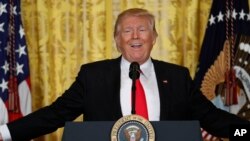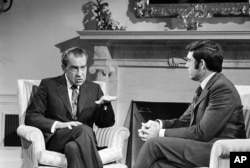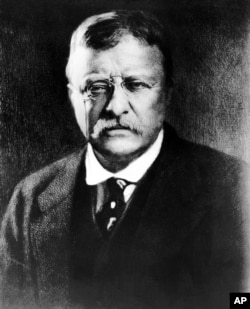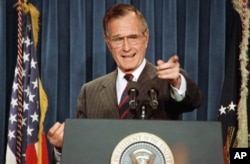An extraordinary 77 minutes. That's how long President Donald Trump stood at the lectern Thursday for a contentious marathon news conference like no other.
But was it?
Veterans of encounters between presidents and the press who tuned in Thursday to Trump's angry defense of his four-week-old administration remembered March 19, 1974, and the performance of President Richard Nixon, then embroiled in the Watergate scandal.
Held at the National Association of Broadcasters' convention in Houston, CBS White House correspondent Dan Rather drew cheers and jeers when he stood to ask a question, prompting Nixon to ask him: "Are you running for something?"
Rather replied, "No, sir, Mr. President. Are you?"
Nixon glared, not appreciating being upstaged by what was, at the time, considered an insolent quip at the president of the United States.
Nixon's fate just months away
Quizzed about withholding information from congressional investigators, Nixon concluded that media encounter by telling NBC's Tom Brokaw: "I will not participate in the destruction of the office of the president of the United States while I am in this office."
Facing impeachment, Nixon resigned less than six months later.
Nixon's performance that day in Houston left "a sense he was more than a little unhinged," said David Greenberg, a professor of history and journalism at Rutgers University.
While Nixon clearly dreaded his encounters with the media, however, Trump appears to relish them.
Trump predicted his latest bout with the media would be summarized with wild headlines. But "I'm not ranting and raving. I love this!" he said, and professed he was "having a good time."
Thursday's news conference in the East Room of the White House was hastily arranged; reporters were given about 90 minutes' advance warning. Ostensibly, it was to announce the president had selected law school dean Alexander Acosta as his nominee for secretary of labor after fast-food chain executive Andrew Puzder withdrew amid a barrage of criticism.
Warnings to 'fake news media'
The new Cabinet nominee was not present, so the announcement was brief. Then the president launched into a long, sometimes rambling monologue touting his campaign promises and making bold assertions that reporters (from what Trump repeatedly referred to as the "fake news media") would soon challenge for veracity.
Unfettered and unbridled, which has endeared him to his political base, Trump "has certainly not won over anybody new, which is what you are supposed to do at this stage of the presidency," Greenberg told VOA.
The Trump performance on Thursday "was unhinged, it was wild," CNN's Jake Tapper declared on air after it was over.
Media critics and political scientists across the spectrum credit Trump for taking to a new level the simplicity of communicating with constituencies — a trait also seen in one of his Republican predecessors, George W. Bush.
"There is a talent in being able to put things in pithy, memorable phrasing," said Greenberg, author of Republic of Spin: An Inside History of the American Presidency.
Trump, in that context, "deserves credit in addition to astonishment," Greenberg said.
Memories of Jackson, Teddy Roosevelt
Historians who seek further presidential comparisons are reaching back to the era way before White House news conferences, recalling the mercurial personalities of Andrew Jackson and Theodore Roosevelt.
The latter, said Greenberg, "could be blind to his own contradictions. But it was couched in a warm, almost ebullient style."
Roosevelt termed the White House his "bully pulpit," which was a platform Trump clearly mounted on Thursday.
"The press, honestly, is out of control," Trump declared, shortly after accusing reporters of "not telling the truth" because they speak for "special interests."
Since televised presidential news conferences began in the era of Dwight Eisenhower in the 1950s (the first ones were not aired live, however), there has been no event surpassed by Thursday's blended stream of consciousness, combativeness and pointed attacks on judges, leakers and reporters.
A veteran reporter: 'Utterly fascinating'
"It was utterly fascinating, so out of the mold," Charles Bierbauer, dean of the College of Information and Communications at the University of South Carolina, told VOA.
The performance was a reflection of the Trump presidency, which "is in a state of constant flux, highly unpredictable," said Bierbauer, a former president of the White House Correspondents' Association who covered the Ronald Reagan and George H.W. Bush administrations for CNN. "It's very much in Trump's nature to be spontaneous, confrontational."
Presidential news conferences, usually lasting 45 minutes or less, generally are meant to get across a particular point. Under Reagan, Bierbauer recalled, they were heavily choreographed.
"We would have never had an event like that" seen Thursday, he said.
However, Bierbauer said, George H.W. Bush was "much more freewheeling," and when it came to planning which reporters would be called on to ask the first questions, he was sometimes impromptu.
'Still acting out the play'
Presidential news conferences usually wind down with a verbal signal from the press secretary: "Last question."
Nowadays, though, "I don't think you can 'last question' Donald Trump," Bierbauer said. He suspects the president sees his public role as an extension of his performance on The Apprentice TV show, but with no set time for ending the program.
"He's still acting out the play," the former CNN correspondent said. "But now we're seeing it in the role of the president, whom we expect to be presidential."
The current White House occupant, according to Bierbauer, appears to have concluded "being presidential means being Donald Trump, not the other way around."
At the end of the day, "this is Trump being Trump, and we will have to get used to it," concluded presidential historian Greenberg.








